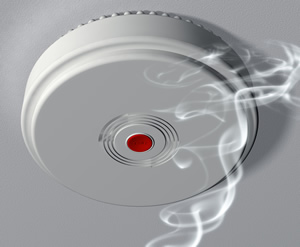
Residential
It is the responsibility of both property owners and tenants to ensure that their fire alarms are both in good condition and properly installed.
An automatic fire alarm system is designed to detect the unwanted presence of fire by monitoring environmental changes associated with combustion. In general, a fire alarm system is either classified as automatic, manually activated, or both. Automatic fire alarm systems can be used to notify people to evacuate in the event of a fire or other emergency, to summon emergency forces aid, and to prepare the structure and associated systems to control the spread of fire and smoke.
Commercial
Fire alarms alert people to potential fire, smoke and excessive heat that could cause a fire. They are placed on ceilings or high on walls, where they will be the most effective as smoke and heat rises. Fires are the leading potential danger in any structure. The danger of fires is very real, as people use flames for both professional and recreational use.
Fire alarms work by sensing smoke or heat and then flashing strobe lights and/or sounding horns loud enough to be heard over ambient noises. Fire alarms strategically placed by code regulations throughout the facility allow appropriate evacuation no matter where people are. Fire alarms systems are hard wired to a building's main electrical system with appropriate battery back-up to sustain power outages for a minimum of 24 hours in normal condition followed by five minutes of alarm. When the battery is running low--or if there is a fault in the electrical system--the fire alarm panel will chirp to alert people when maintenance is needed.
In addition to having fire alarms installed in every room of a building, it is highly recommended that every property has a fire extinguisher--particularly if there is a kitchen, as that is the most likely room to have a fire. If a structure is particularly large, multiple fire extinguishers are recommended. Finally, it is equally important that buildings have escape plans in the event of a fire. Businesses run greater risks of fire than homes. The higher traffic of people, the increased activity, and the likelihood of higher volumes of combustible materials mean that commercial fire alarms must always be functioning to safeguard against excessive fire damage. Too many disasters can be avoided, or at least minimized, by the presence of commercial fire alarms to ever justify skimping on these important items.
Commercial fire alarms are stand alone and/or networked throughout the premises. This allows people to evacuate and respond to any dangers with the greatest lead time possible, regardless of their proximity to the actual fire. The addressable points of a commercial fire alarm system must be appropriately spaced by professional installation teams. A commercial fire alarm system is only as good as the way it is set up.
Commercial fire alarms work by sensing smoke and/or heat. They then turn on notification devices such as horns, strobes, or combination horn/strobes loud enough to be heard both inside and outside the building and bright enough to notify the hearing-impaired, thereby alerting the greatest number of people possible. They are hard-wired to the main fire alarm control panel with battery back up and can often be connected to local fire departments and central station monitoring firms.






